|
GRADUATION SUNDAY

|
“Don’t try to fix the students, fix ourselves first. The good teacher makes the poor student good and the good student superior. When our students fail, we, as teachers, too, have failed.” |
| —Marva Collins
|
Sunday, June 5, 2011
Guest Writer for This Unit: Willie Dwayne Francois III. An associate minister of the Wheeler Avenue Baptist Church (Houston, Texas), Willie Dwayne Francois III is a second-year Master of Divinity candidate at Harvard Divinity School and the President/Co-Founder of the Preacher as Scholar Association, Inc.
The unit you are viewing, Graduation Sunday, is a compact unit. This means that it does not have a supporting cultural resource unit and worship unit. Instead, to enliven the imagination of preachers and teachers, we have provided scriptural text(s) that we suggest for this moment on the calendar along with a sermonic outline, suggested links, books, articles, songs, and videos. For additional information, see Graduation Sunday in the archives of the Lectionary for 2008–2010. 2011 is the first year that the African American Lectionary has posted compact units for moments on its liturgical calendar.
I. Description of the Liturgical Moment
Graduation Sunday provides a time for congregations to reflect on and celebrate communally the recent academic accomplishments and unlimited potential of congregants—young and old. For faith communities of African Americans and people of color, graduations highlight the resilience and perseverance of students and the unceasing prayers and varied support of the village—family, church, and community at large. As a result of centuries of American racism(s)—slavery, Jim Crow, and the current proliferation of mass incarceration—African Americans struggle in various freedom projects to ensure access to education. In the backdrop of systemic disparities in education and high dropout rates in communities of color, Graduation Sunday enables dispossessed communities a chance to undermine stereotypes of intellectual inferiority, academic lethargy, and low ambition that the dominant society maps on to black and brown bodies.
Creatively observed throughout worship, many churches recognize elementary, middle school, high school, college, and post-baccalaureate graduates. Each group has overcome many social, familial, and economic issues to arrive at this “High Holy” occasion. Complimenting Collegiate Baccalaureate services and the actual Graduation Day, this Sunday is reserved to acknowledge the role of God in the academic lives of students with cum laude or “thank you, Lordy” status. Considering the various barriers to educational achievement, their achievement was also made possible as a result of the love, encouragement, and support of African American churches.
In this service, the graduates may be anointed with oil, requested to recite litanies, and expected to hold their communities in mind as they “expand their territory.” As they embark on new terrain—high school, college, graduate or professional school, or others areas of call—the graduates receive a gift and a challenge.
Graduation Sunday is a call to action for the graduates and the church community to ensure possibilities for future graduates. As privileged and educated African Americans, they inherit the obligation and duty to live a life of service and assistance to those in need. In the theology of Emmanuel Levinas, the transcendent occurs—God manifests—in beholding “the face,” liberating, and meeting the needs of the other. Graduation Sunday calls to mind our blessed privileges alongside our burgeoning priorities.
II. Graduation Sunday: Sermonic Outline
A. Sermonic Focus Text(s): John 14:12 (New Revised Standard Version)
“Very truly, I tell you, the one who believes in me will also do the works that I do and, in fact, will do greater works than these, because I am going to the Father.”
B. Possible Titles
i. Emancipating Your Expectations
ii. Pressing Past the Paradigm
iii. Redefining the Possible
C. Point of Exegetical Inquiry
Nestled in the extensive farewell discourse of the Johannine account, Jesus empowers the despondent and anxiety-minded disciples, his cadre of companions, by naming the paradox of witnessing, embracing, and fellowshipping in his exemplary power: “Greater works shall we do.” One exegetical inquiry is that this is the first instance in which the Johannine recorders reference works (miracles) with regard to the disciples’ function. The Johannine authors reserved the exhibition of works (signs and wonders) for Jesus until this point to advance the Messianic uniqueness of Jesus.1 Purposely, the disciples perform no signs in the Johannine texts, but here they are commanded to do greater things than, build and not solely rest upon, the works Jesus performed in their presence.
III. Introduction
In her incisive and indicting book, The New Jim Crow: Mass Incarceration in the Age of Colorblindness, Michelle Alexander unveils one of the leading symptoms of racialized discrimination in America today that constructs ceilings of steel strength on the academic achievement of black and brown bodies and minds. Because of certain acts, our sisters and brothers are denied access to public benefits, occupation, and education. When you consider the high school dropout epidemic in America, do not fail to realize that these youth are often grafted into the jail trail with no hope of escape. Their potential is smothered, constructive ambitions are extinguished, deficiencies are accentuated, and dreams are bleached away by violence and narcotics.
Many of our sisters and brothers go through life ignorant of nurture, empowerment, and pride of moments likes today’s occasion. It comes as no surprise, in light of systemic and socially engineered disparities, that we adjudge graduations to be miracles for many in this nation. On this Sunday, Graduation Sunday, we seize the opportunity to recognize the feats of diligent workers, affirm the potential of discounted persons, and relate the ensuing uncertainty and promise of greatness to the cost of discipleship. Each graduation indicates that we should have grown in wisdom, stature, and ability before God. Whether we have or not will be known by the works that we do. This momentary feat, with all of its elations and perplexities, is meant to catapult us into living service with God. For us the completion of one achievement signals the commencement of a greater work.
In the backdrop of the anxiety concerning the departure of Jesus and the uncertainty of the future of “the Way” movement, Jesus expects and empowers his disciples, those who situate their trust in his being and works, to exceed his exceptional exhibition of his integrity, identity, and incessant power. In our text today, Jesus offers a commencement address of sorts to despondent, disenchanted, and dazed disciples. A lowly carpenter, a penniless prophet from Palestine, lived out his relationship with God in the midst of economic corruptness, imperial occupation, and ethnic bigotry. This marginalized man of humble beginnings reshaped the God-human encounter, brought light to dark existences, articulated life to impotent limbs and dysfunctional faculties, enlivened and cleared cobweb-covered minds and hearts, provided healthcare and nourishment to masses of unconscious have-nots, and resuscitated lifeless corpses.
The goal of every believer is to mature and do great works in their respective context(s) of calling. God expects us to transcend debilitating self-assumptions and the illusion of our limitation in order to live out our call as Children of God. Without equivocation, Jesus tells his disciples that greater works await their hands, hearts, and heads. That same word is being boldly whispered to our souls in this present age: “Greater things than these you will do.”
IV. Moves/Points (specific to the disciples in the text while proving applicable to the situation of graduates and present-day disciples of Jesus)
Move/Point One – We Are Expected to Continue the Effort
a. Regardless of Ambiguities.
It is important to remember that this verse reads within the context of Jesus’ final discourse with the disciples, which must speak to the uncertainty and fears the disciples experience as their leader faces execution and the movement’s and its personalities’ futures hang in the balance.
b. Remembering the Teachings.
In Johannine discourse, “Very, truly I tell you” indicates the commencement of a past or new teaching of Jesus. In the absence of the teacher, the pupils must hold the teacher’s instructions in mind. To continue this reality-reshaping work, the disciples must remember his teachings.
c. Recognizing the Example.
“The one who believes in me will also do the works that I do . . .” At a minimum, disciples must demonstrate familiarity with and perpetuate the works the teacher performed.
Move/Point Two – We Are Encouraged to Conceive Exceedingly
Beyond the expectation of replicating the works of Jesus, the disciples are implored to do greater works; whether in scope of influence or in physical acts is perennially debated.
a. Work beyond the limits of your experience.
Aforementioned, according to the Johannine record, the disciples had only watched the works of Jesus. Without the experience of performing any works on their own, Jesus charges them to act beyond their points of reference. They were expected to do what they had not done or seen.
b. Work beyond the limits of self-uncertainty.
How much confidence can they have in themselves as they embark on uncharted and unrealized territory in the physical absence of their leader?
c. Work beyond the limits of public opinion.
As Jesus is departing, in the public square the verdict is still out on the validity of his identity. The crucifixion speaks to this reality. According to vv. 8-10, Philip’s response intimates the lack of consensus within the disciple camp in reference to Jesus’ identity. They are expected to transcend these inconclusive opinions.
Move/Point Three – We Are Empowered by Our Connection to the Eternal
a. Assigns new worth to your work.
Per Jesus’ custom, in the preceding verses, he clarifies that the work in which he is engaged is God’s work. When one understands the source of their gifts and passion, they conceptualize their work in relation to rendering the Glory to God.
b. Accessed by faith.
“…anyone who has faith in me…” The key to our relationship with God and activating the power native to our identity in God is faith—being totally grasped by the Unseen Reality.
c. An Abiding presence.
In this pericope, Jesus’ ensuing ascension gestures toward a pneumatological advent. The Spirit will perennially empower, escort, and enact the disciples and our Kingdom-minded undertakings—a creative and adventurous collaboration with God.
V. Celebration
God empowers us to do and be what we have never done and been before—what we never thought was possible in our lives. As you dream new goals and new directions, always factor in the provisional power of God’s presence. My sights are set on God’s superintending power in my life. Fears evaporate, anxieties curtail, and pain passes as God shatters the false senses of reality rooted in our insecurities, past failures, and the toxicity of comfort! Trust God for NOW. That is why my grandparents would sing with great temerity and without fear of contradiction that God “walks with me and talks with me and tells me that I am his own.”
We are empowered to pursue beyond what people deemed possible for us and beyond all the paradigms even great people have set for us: beyond the heroic resolve of Nat Turner, the righteous indignation of David Walker, the inescapable conviction of Jarena Lee, the missionary diligence of Nannie Helen Burroughs, the intellectual acumen of W.E.B. Du Bois, the demonstrative discontent of Fannie Lou Hammer, the literary genius of James Baldwin, the walking integrity of Benjamin Elijah Mays, the spiritual audacity Howard Thurman, and the prophetic passion of Martin Luther King Jr. We are moving beyond all of that. The Spirit is pushing us beyond our wildest dreams!
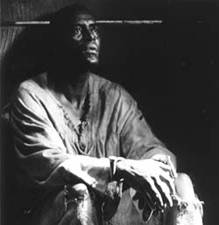 |
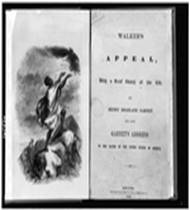 |
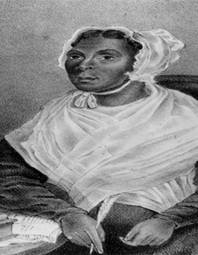 |
|
| Nat Turner |
David Walker’s Appeal |
Rev. Jarena Lee |
|
| |
|
|
|
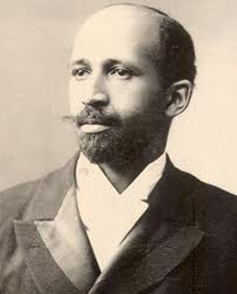 |
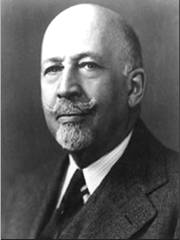 |
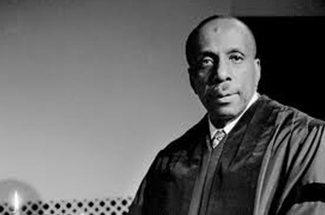 |
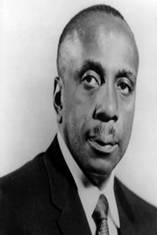 |
| Nannie H. Burroughs |
W. E. B. Du Bois |
Benjamin E. Mays |
Howard Thurman |
As often uttered on the streets of urban centers across this nation, we confidently intone that we “Got a Connect!” We have a hookup not conditioned by our fears, not limited by out anxieties, and not discouraged by out procrastination. We have a hookup—he who was hooked up to a cross. If you have this same Holy hookup, holler if you hear me. We can depend on the radical consistency of our God. I am living for, on, and through the promise of his presence—a freedom that cannot be legislated, potential that cannot be charted, love that cannot be defeated or compromised, peace that cannot be repossessed, and hope which cannot be held hostage by hatred of the other. God “is able to do exceeding abundantly above all that we ask or think, according to the power that worketh in us”(Eph. 3:20, KJV). We can throw our weight on the unfailing omnipresence of God in every situation. Why? The venerable hymn writer Thomas O. Chisholm answers:
Pardon for sin and a peace that endureth
Thine own dear presence to cheer and to guide;
Strength for today and bright hope for tomorrow,
Blessings all mine, with ten thousand beside!
Great is Thy faithfulness!
Great is Thy faithfulness!
Morning by morning new mercies I see.
All I have needed Thy hand hath provided;
Great is Thy faithfulness, Lord, unto me!2
VI. Illustrations
I Will Still Show Up
While I am fundamentally a lover of the theatre, I often find myself gripped by and glued to my television watching plays that have been converted into movies. Whether it’s the added graphics or the altered scripts, I cannot really pinpoint the reason I am so intrigued by these made-for-TV movies from plays. In the HBO adaptation of Cormac McCarthy’s play The Sunset Limited, Samuel L. Jackson and Tommie Lee Jones offer contrasting images of life in New York City. In this two-man play turned movie, we see a creative dialogue between the philosophical and the religious, a professor and an ex-con, a have and a have-not, the suicidal and the faithful. Taking place in the modest studio apartment of Jackson’s character, the two discussed issues of faith and reasons why Jones’s character resolved to resign from the human race by leaping in front of the moving Sunset Limited express rail when Jackson intervened to save his life. Jackson insists that God sent him there for that very moment—to save Jones.
After spending the entire movie in this room and not dissuaded from attempting suicide a second time, Jones storms out of the apartment avowing to kill himself in the morning by leaping in front of the Sunset Limited. Upset because the movie is ending differently than I anticipated, Jackson makes an unforgettable move for me. He storms back toward the sofa yelling, “I will keep your word. I will be there in the morning. I will be there in the morning.” While he seemingly failed to convince Jones of the value of his life, he was willing to try it all over again the next day. He said to God, “You sent me down there to help him, but I didn’t have the right words to convince him. However, I will be there in the morning, because you told me to.” In terms of our own calls, that is the type of resolve we need. You must believe the call despite your feelings of inadequacy/failure, because you’ve learned to trust God’s faith in you.
—Willie Dwayne Francois III
Canoeing with God
Several summers ago, my husband, Oliver, and I went to visit our friends who have a summer home on Newfound Lake in New Hampshire. When we arrived, they announced that they had scheduled the four of us for an early morning nature exploration on Newfound Lake—in canoes. Now understand that neither my husband nor I had ever been in a canoe, but—hey—how hard could it be?
Now, in case you know nothing about canoeing, it is a strictly two-person operation. We managed to get into our canoe without falling into the lake. We pushed off from the dock, only to be told by the nature trip guide that we were in the canoe backwards and needed to go back to the dock to get ourselves turned around in the right direction. We managed this also, without falling into the lake.
Our next learning experience was our roles as partners in this adventure and how to use the paddles. Now the person in front has the responsibility to determine the direction of the canoe, and the person in the back provides the power.
In your relationship with God, you are in a two-person canoe. God provides the direction and power, and you just need to follow instructions.
—Youtha Hardman-Cromwell
This illustration is from the sermon illustrations section of the African American Lectionary.
VII. Sounds, Sights, and Colors in This Passage
| Sounds: |
The voice of Jesus;
|
| Sights: | The Upper Room scenery; bodies of the disciples; confused and distressed faces; Jesus; and
|
| Colors: | The dark brown table around which Jesus and the disciples sat; the colors of the foods upon which they dined; and the varieties of colors of their clothing. |
VIII. Songs to Accompany This Sermon
A. Hymns
- Give of Your Best to the Master. By Howard B. Grose. Tune, (BARNARD), with refrain by Charlotte A. Barnard. (Morning Hymn)
- Great Is Thy Faithfulness. By Thomas O. Chisholm. Tune, (FAITHFULNESS), by William M. Runyan (Hymn of Preparation/Sermonic Selection)
- This Is the Day. Tune by Les Garrett. Arr. by Stephen Key (Morning Hymn)
B. Well-Known Songs
- Bless Me (Prayer of Jabez). By Donald Lawrence (Invitational)

- You’ve Been So Faithful. By Eddie James (Praise and Worship)

- We Made It. By Hezekiah Walker (Choir Selection)

- Power Belongs to God. By David Frazier and Hezekiah Walker

C. Spiritual(s)
- O Lord, Done Done. Arr. by Roland Carter

- I Know the Lord Has Laid His Hands on Me. Negro spiritual
D. Modern Songs
- The Best Is Yet to Come. By Donald Lawrence (Choir Selection)

- I Give Myself Away. By William McDowell (Praise and Worship)
 
- What He’s Done for Me. By James Hall (Praise and Worship)

- More Like Him. By Eric McDaniels
You can review past Lectionary worship units for Graduation Sunday to find additional songs and suggestions for planning a worship service for this liturgical moment.
IX. Videos, Audio, and/or Interactive Media
X. Books and Articles to Assist in Preparing Sermons or Bible Studies Related to Graduation Sunday
Religious Education
- “The Role of African-American Churches in Reducing Crime Among Black Youth.” Johnson, Byron R. CRRUCS Report 2001. Philadelphia, PA: University of Pennsylvania, 2001. Online location: http://www.manhattan-institute.org/html/crrucs2001_2.htm accessed 12 January 2011
- Black Church Beginnings: The Long-Hidden Realities of the First Years. Mitchell, Henry H. Grand Rapids, MI: WM B. Eerdmans Publishing, 2004. pp. 156–161. Remind your congregation that African American denominations also founded primary and high schools. Henry Mitchell writes, “In the case of both primary and secondary schools, their church-based schools bridged the gap the white-sponsored schools could not close until the day of public schools. A.M.E.’s, A.M.E.Z’s, and C.M.E.’s as well as African American Baptists, all boldly took on the more reachable goal of primary and then secondary education.”
- Can the Black Church Save Young Black America? Closing the Educational Achievement Gap. Richardson, Temeca L. Much Lov 2 Give, LLC: 2007. Dr. Richardson argues convincingly for the involvement of African American and inner city religious institutions to bridge the ever-widening academic achievement gap between white and black students.
- “Friends, Family and Neighborhood: Understanding Academic Outcomes of African American Youth.” Williams, Trina R., et. al. Urban Education. 37:3 (May 2002). Religiosity, exposure to academic success, and perceptions of one’s neighborhood influence academic success. Church involvement has a positive effect on academic self concept and church support influences student outcomes and conduct. Online location: http://www.google.com/url?sa= t&source=web&cd =7&sqi=2&ved=0CDsQ FjAG&url= http%3A%2F%2Fwww.pineforge.com%2 Fballantinestudy%2Farticles%2FChapter14_Article01.pdf &ei= 7tt9TaabH oLsOZ6M-fAG&usg= AFQjCNHqTP2Uwb7mmBGuUMgSerCS-Rks7Q&sig2=rdX7hvs9gaj4sngU6wqcqQ accessed 12 January 2011
Secular Education
- The Education of Black Folk: The Afro-American Struggle for Knowledge in White America. Ballard, Allen B. New York, NY: Harper&Row, 1973.
- “John” in True to Our Native Land: An African American New Testament Commentary. Callahan, Allen D. Ed. Brian K. Blount. Minneapolis, MN: Fortress Press, 2007, pp. 186–212.
- A Dream Deferred? Examining the Degree Aspirations of African American and White College Students. Carter, Deborah Faye. New York, NY: Routledgefalmer, 2001.
- “Infinite Freedom, Creativity and Love: The Adventures of a Non-Competitive God.” Epperly, Bruce G. Encounter. 71, no. 2, Spring 2010. pp. 45–53.
- “John” in The Queer Bible Commentary. Goss, Robert E. Ed. Deryn Guest, et al. London: SCM, 2006. pp. 548–565.
- Mishel, Lawrence R. Rethinking High School Graduation Rates and Trends. Washington: Economic Policy Institute, 2006.
- Schooling Citizens: The Struggle for African American Education in Antebellum America. Moss, Hilary J. Chicago, IL: University of Chicago Press, 2009.
- “John” in New Interpreter’s Vol. IX. O’Day, Gail. Nashville, TN: Abingdon Press, 1995. pp. 491–865.
- “John” in Global Bible Commentary. Park, Kyung-mi. Ed. Daniel Patte and Teresa Okure. Nashville, TN: Abingdon Press, 2004. pp. 401–411.
- “The Gospel of John” in Searching the Scriptures: A Feminist Commentary. Vol. 2. Reinhartz, Adele. Ed. Elisabeth Schussler Fiorenza. New York, NY: Crossroad, 1994. pp. 561–600.
- Gospel of John: Believe and Live. Towns, Elmer. Old Tappan: F. H. Revel Co., 1990.
XI. Links to Helpful Websites for Graduation Sunday
- For an exciting and dynamic educational environment, encourage your community middle school to actively incorporate African American culture and history into its daily routine. J.S. Chick Elementary School is an African American culturally centered success story. “Test Scores Exceed State Averages at J.S. Chick Elementary School, Where African-American Students View Themselves As Leaders.” Teicher, Stacey. Christian Science Monitor. 2006 Online location: http://www.csmonitor.com/2006/0608/p14s01-legn.html accessed 14 January 2011
- In 1995, The Bell Curve was published, claiming, among other things, that Marva Collins’s celebrated style of teaching was “too good to be true” in part because genetically non-whites are inferior in intelligence. After reading the synopsis, Morley Safer of 60 Minutes decided to revisit a story he reported on 16 years previously. Whatever happened to Marva Collins’s students? Where were they now? Is Westside Preparatory still functioning? Part 1: http://www.YouTube.com/watch?v=H7LPpsp_Qh0 and Part 2: http://www.YouTube.com/watch?v=DxsCDyGSU1A&feature=related accessed 12 January 2011
- Quotes by Marva Collins from Wikipedia. Online location:
http://en.wikipedia.org/wiki/Marva_Collins accessed 13 January 2011
“There is a brilliant child locked inside every student.”
“The essence of teaching is to make learning contagious, to have one idea spark another.”
“Success doesn’t come to you . . . you go to it.”
“Excellence is not an act but a habit. The things you do the most are the things you will do best.”
“Trust yourself. Think for yourself. Act for yourself. Speak for yourself. Be yourself. Imitation is suicide.”
“Determination and perseverance move the world; thinking that others will do it for you is a sure way to fail.”
“Character is what you know you are, not what others think you have.”
“If you can’t make a mistake, you can’t make anything.”
- For more inspiring stories of Famous Black Educators, visit this webpage hosted by Midwestern State University Texas. Online location: http://faculty.mwsu.edu/west/diversity/bhm/educators.asp accessed 12 January 2011
- Alabama Institute for the Deaf and Blind helps students of all ages gain skills for independent living. “On the Road to Independence: Reinforced by CARF Accreditation AIDB’s Gentry helps students return the workforce and live the most independent lives possible.” Ross, Jessica. Sights & Sounds. Online location: https://coolfocus.waycoolsw.com/Files/AIDB/documents/S&SFallweb07.pdf p. 7 accessed 20 January 2011
Information Resources
Organizations for Collaboration
XII. Notes for Selected Songs
A. Hymns
- Give of Your Best to the Master. By Howard B. Grose. Tune, (BARNARD), with refrain by Charlotte A. Barnard
Location:
African American Heritage Hymnal. Chicago, IL: GIA Publications, 2001. #465
- Great Is Thy Faithfulness. By Thomas O. Chisholm. Tune, (FAITHFULNESS), by William M. Runyan
Location:
African American Heritage Hymnal. #158
- This Is the Day. Tune by Les Garrett. Arr. by Stephen Key
Location:
West Angeles COGIC Mass Choir. Saints in Praise Volume 1. Nashville, TN: Sparrow, 1992.
African American Heritage Hymnal. #108
B. Well-Known Songs
- Bless Me (Prayer of Jabez). By Donald Lawrence
Location:
Donald Lawrence and the Tri-City Singers. Go Get Your Life Back. Brentwood, TN: EMI Gospel, 2002.
- You’ve Been So Faithful. By Eddie James
Location:
The Phoenix Mass Choir. Higher. Decatur, AL: Fresh Wine Records, 1995.
- We Made It. By Hezekiah Walker
Location:
Hezekiah Walker and LFC. Family Affair 2: Live at Radio City Music Hall. New York, NY: Verity, 2002.
- Power Belongs to God. By David Frazier and Hezekiah Walker
Location:
The Essential Hezekiah Walker. New York, NY: Zomba Recordings LLC., 2007.
C. Spirituals
- O Lord, Done Done. Arr. by Roland Carter
Location:
Morehouse College Glee Club. Wit and Wisdom (Volume 13). Atlanta, GA: Morehouse College, 1997.
Online location: www.mcgclub.com
- I Know the Lord Has Laid His Hands on Me. Negro spiritual
Location:
African American Heritage Hymnal. #360
Performed by Dr. Charles G Hayes and The Warriors and The Voices of Cosmo during the April 19, 2009 broadcast, on the occasion of their 50th Year Church Anniversary. Online location: http://www.YouTube.com/watch?v=JBm3iCKBSeI accessed 13 January 2011
D. Modern Songs
- The Best Is Yet to Come. By Donald Lawrence
Location:
Donald Lawrence and the Tri-City Singers. Go Get Your Life Back. Brentwood, TN: EMI Gospel, 2002.
- I Give Myself Away. By William McDowell
Location:
As We Worship: Live. New York, NY: Koch Records, 2009.
- What He’s Done for Me. By James Hall
Location:
James Hall and Praise & Worship. God Is in Control. Denver, CO: Intersound Records, 1994.
- More Like Him. By Eric McDaniels
Location:
Eric McDaniels & the Lord’s Church Cathedral Choir. We Are Healed. New York, NY: Gospel 1, 2003.
Notes
1. Köstenberger, Andreas J. “The ‘Greater Works’ of the Believer According to John 14:12.” Didaskalia (Otterburne, Man.), 6, no. 2, Spring 1995. pp. 36–45.
2. Chisholm, Thomas. “Great Is Thy Faithfulness.” Ardythe Petersen and William J. Peterson. The Complete Book of Hymns: Inspiring Stories about 600 Hymns and Praise Songs. Carol Stream, IL: Tynsdale House Publishing, 2004. p. 393.
|